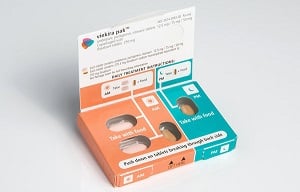AbbVie ($ABBV) won an expected FDA approval for its next-generation treatment for hepatitis C, kicking off a race with Gilead Sciences ($GILD) for dominance in a blockbuster field. And AbbVie quickly started a behind-the-scenes price war, persuading the big pharmacy benefit manager Express Scripts to make it their exclusive drug for most patients in exchange for a deep discount.
 |
| Viekira--Courtesy of AbbVie |
The agency has signed off on AbbVie's four-agent combo, which combines the new treatments ombitasvir, paritaprevir and dasabuvir with the company's previously approved ritonavir. The multipill treatment, which will sell as Viekira Pak, works much like Gilead's competing Harvoni, using a cocktail of antivirals to halt viral replication.
The approval is based on data from 6 Phase III studies in which AbbVie's combo therapy clocked impressive 12-week cure rates, notching a 99% sustained virologic response mark in some hep C populations, including patients with the tough-to-treat genotype 1. Those stellar results came without the need for interferon injections, which often lead to uncomfortable flulike symptoms.
Analysts expect AbbVie's treatment to bring in more than $3 billion a year at its peak. And while that's enough to spell AbbVie's biggest product since Humira, which loses patent protection in 2016, it's just a fraction of the $10 billion in global sales pegged for Gilead's Harvoni. Despite the two treatments charting similar efficacy across their pivotal trials, Gilead's drug, approved in October, demands patients take just one pill a day while AbbVie's regimen will require at least four pills, plus the older drug ribavirin.
Harvoni's cost--$94,500 for a 12-week regimen--has spurred gripes, protests and threats from payers around the world, giving AbbVie the chance to chip away at Gilead's market share by undercutting the sticker price.
Late on Friday AbbVie spread the word that it will sell its cocktail therapy for $83,319 for a 12-week regimen. That's a 12% discount on Harvoni, well below the 15% to 20% price reduction that Wall Street analysts had been expecting and virtually the same as Gilead's Sovaldi price, which triggered a fierce reaction among healthcare payers. That's enough to move some market share, but not nearly enough to quiet the controversy around hep C drug pricing. This wholesale acquisition price will help establish a high bar going into negotiations with Europe's single-payer system as well as one-on-one talks with U.S. payers.
But AbbVie is clearly prepared to wheel and deal on the wholesale price.
At the stroke of midnight on Sunday, Express Scripts released the news that it was making Viekira Pak the exclusive drug for genotype 1 patients after wresting a "deep discount" on the price, according to Bloomberg. Express Scripts covers 25 million people in the U.S., and it used that leverage to negotiate a better price--a strategy that other payers will follow as best they can.
The FDA's approval of Viekira Pak is also a boon for Enanta ($ENTA), which partnered on one of the drugs in the cocktail. The biotech picks up a $75 million milestone on the approval, bringing its total so far to $227 million.
The rapid-fire series of events roiled share prices on Monday morning. AbbVie shares surged initially but were trading in the red mid-morning while Gilead's stock was down a hefty 11%. Enanta's stock was up 7%.
No matter which company wins out, the approval of a second next-gen hep C treatment is good news for the roughly 3.2 million Americans who suffer from the virus. Since the launch of Gilead's Sovaldi last year, the standard of care for hep C has forever changed, ushering in a new era of all-oral treatments that leave behind painful injections.
"The new generation of therapeutics for hepatitis C virus is changing the treatment paradigm for Americans living with the disease," Dr. Edward Cox, director of the FDA's Office of Antimicrobial Products, said in a statement. "We continue to see the development of new all-oral treatments with very high virologic response rates and improved safety profiles compared to some of the older interferon-based drug regimens."
- read the release
- here's Bloomberg's story
John Carroll contributed to this report.